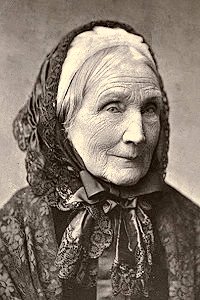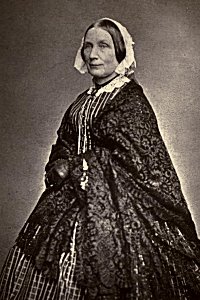Introduction

Born: March 12, 1799, Coleford, Gloucestershire, England.
Died: January 30, 1888, Rome, Italy.
Buried: Campo Cestio, Città Metropolitana di Roma Capitale, Lazio, Italy.


Born: March 12, 1799, Coleford, Gloucestershire, England.
Died: January 30, 1888, Rome, Italy.
Buried: Campo Cestio, Città Metropolitana di Roma Capitale, Lazio, Italy.

Howitt was born at her parents’ temporary residence while her father, Samuel Botham, a prosperous Quaker of Uttoxeter, Staffordshire, was looking after some mining property.
Her mother was Anne Wood, a descendant of Andrew Wood, the patentee (attacked by Swift in the Drapier Letters).
Mary was educated at home, and soon read widely for herself in many topics, and began writing verse at a very early age.
On April 16, 1821, she married William Howitt at Uttoxeter, and began a career of joint authorship with her husband. Their literary productions at first consisted chiefly of poetical and other contributions to annuals and periodicals.
Mary’s life was completely bound up with that of her husband. She was separated from him only during the period of his Australian journey (1851–54).
On moving to Esher, Surrey, in 1837, Mary began writing her well known tales for children, a long series of books which met with signal success. She is the author of the famous poem The Spider and the Fly.
While living in Heidelberg in 1840, her attention was directed to Scandinavian literature, and with her friend Madame Schoultz, she set herself to learn Swedish and Danish.
She afterward translated Fredrika Bremer’s novels (1842–63, 18 volumes), works, and was the first to make them known to English readers. She also translated many of Hans Christian Andersen’s tales. The Literary Academy of Stockholm later awarded her a silver medal.
Botham edited for three years the Drawing-Room Scrap Book, contributing, among other articles, Biographical Sketches of the Queens of England.
She also edited the Pictorial Calendar of the Seasons and contributed to The Literature and Romance of Northern Europe, 1852.
On April 21, 1879, she was awarded an annual civil list pension of £100.
In the decline of her life, Botham joined the church of Rome, and was one of the English deputation received by Pope Leo XIII on January 10, 1888.
Will you walk into my parlour?
said a spider to a fly;
’Tis the prettiest little parlour that ever you did spy.
The way into my parlour is up a winding stair,
And I have many pretty things to shew when you are there.
Oh no, no!
said the little fly, to ask me is in vain,
For who goes up your winding stair can ne’er come down again.
I’m sure you must be weary, with soaring up so high,
said the spider to the fly.
Will you rest upon my little bed?
There are pretty curtains drawn around, the sheets are fine and thin;
And if you like to rest awhile, I’ll snugly tuck you in.
Oh no, no!
said the little fly, for I’ve often heard it said,
They never, never wake again, who sleep upon your bed!
Said the cunning spider to the fly, Dear friend, what shall I do,
To prove the warm affection I’ve always felt for you?
I have, within my pantry, good store of all that’s nice;
I’m sure you’re very welcome—will you please to take a slice?
Oh no, no!
said the little fly, kind sir, that cannot be,
I’ve heard what’s in your pantry, and I do not wish to see.
Sweet creature!
said the spider, you’re witty and you’re wise.
How handsome are your gauzy wings, how brilliant are your eyes!
I have a little looking-glass upon my parlour shelf,
If you’ll step in one moment, dear, you shall behold yourself.
I thank you, gentle sir,
she said, for what you’re pleased to say,
And bidding you good morning now, I’ll call another day.
The spider turned him round about, and went into his den,
For well he knew, the silly fly would soon come back again:
So he wove a subtle web, in a little corner, sly,
And set his table ready, to dine upon the fly.
Then he went out to his door again, and merrily did sing,
Come hither, hither, pretty fly, with the pearl and silver wing;
Your robes are green and purple—there’s a crest upon your head;
Your eyes are like the diamond bright, but mine are dull as lead.
Alas, alas! how very soon this silly little fly,
Hearing his wily, flattering words, came slowly flitting by;
With buzzing wings she hung aloft, then near and nearer drew,
Thinking only of her brilliant eyes, and green and purple hue—
Thinking only of her crested head, poor foolish thing!—At last
Up jumped the cunning spider, and fiercely held her fast.
He dragged her up his winding stair, into his dismal den,
Within his little parlour—but she ne’er came out again!
And now, dear little children, who may this story read,
To idle, silly, flattering words, I pray you ne’er give heed:
Unto an evil counselor, close heart, and ear, and eye,
And take a lesson from this tale, of the Spider and the Fly.
Mary Botham Howitt
The New Year’s Gift and Juvenile Souvenir, 1829